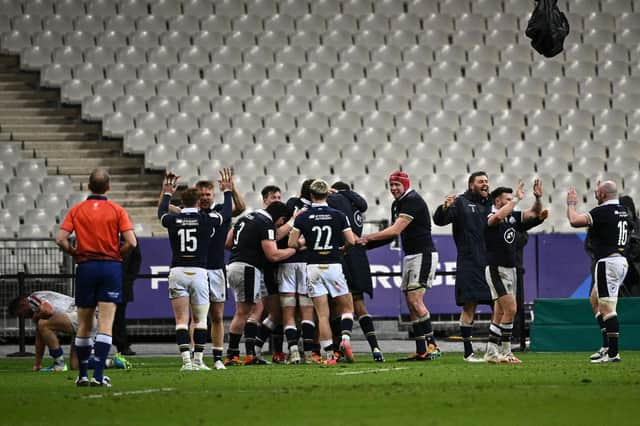Allan Massie: Six Nations shrouded in unavoidable uncertainty - all we can ask for is balanced tournament


We all, I’m sure, hope and indeed want, matches to be played on home grounds before large crowds. However, the report that the Welsh Rugby Union has been exploring the possibility of playing their “home” games in England is not encouraging. There is a precedent for this of course. In 1999 they played “home” games at Wembley when what was then called the Millennium Stadium was being constructed. This didn’t workout badly. They beat England memorably on the last day of the tournament when a late try by Scott Gibbs converted by Neil Jenkins not only secured victory, but ensured that Scotland were the last Five Nations champions. Of course, even though that Wales-England match was played in London, it was the WRU which sold tickets; so there were probably more Welsh than English fans in the ground.
Playing last season’s tournament behind closed doors produced more good and exciting rugby than had seemed likely, but also more surprising results. Scotland won at Twickenham and in the Stade de France, but lost to Wales and Ireland at Murrayfield. We also beat Wales in the autumn of 2020, at Llanelli, not Cardiff, in a match held over from the spring. Over the years we have been accustomed to losing away from home while often compensating by wins at Murrayfield. Indeed, there were five away victories (discounting matches against Italy) in last season’s tournament, more than in any recent season. 2018 for instance there were only two away wins in the tournament (again discounting Italy) and in 2017 only one. All this indicates that the presence of a home crowd does indeed often make a difference.
Advertisement
Hide AdAdvertisement
Hide AdThe conclusion must be that to have a fairly balanced tournament all games should be played before crowds or behind closed doors. It would for instance be unsatisfactory if England played Scotland in an empty Murrayfield, but Wales and Ireland in a packed Twickenham. So we must all hope that the omicron strain of the virus ebbs in the next couple of weeks.
Meanwhile, there are URC and European matches to be played this month – some, sadly, in the absence of a crowd. Edinburgh and Glasgow are both at home today, against Cardiff and Ospreys respectively, and at the moment of writing, both games seem likely to be played. Mike Blair is continuing with the experiment of playing Blair Kinghorn at fly-half. Perhaps he has already played enough games in that position for the word “experiment” to be out-of-date. Certainly the more matches he plays successfully in that position, the easier it will be for Gregor Townsend if he wishes to have six forwards and only two backs on the bench, given that Kinghorn can cover full-back and wing as well as fly-half. That might be rather bad luck for Adam Hastings and Ross Thompson, both, at present anyway, perhaps better fly-halves than Kinghorn. There is indeed a good case for picking Thompson as reserve for Finn Russell. Not only has he been playing very well for Glasgow in a calm intelligent manner; he is also probably the most reliable goal-kicker we have.
Scotland have more strength in the forwards now than for a very long time, if indeed ever. So one wonders if Gregor may be tempted to follow the South African example and keep his stronger front row to the second half, which is, after all, when matches are more often than not won or lost. Of course the second-half South African front row is probably the best in the world, a daunting sight when they trot on to the field.
Many of us would like to see the number of permitted replacements reduced sharply. I doubt however if any coaches are of this opinion. Timely and well-judged substitutions offer coaches their best chance of influencing the later stages of a match. Some Scotland coaches in the past might have been happier to see fewer replacements allowed, for it has often seemed that Scottish replacements were not as good as the players from whom they were taking over, and, importantly, not near as good as those the opposition brought on. But, happily, we have more strength in depth now. So this is, one thinks – hopes anyway – no longer the case.